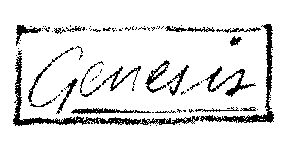


In pursuit of success, Genesis took the scenic route. It was 10 years before they scored their first hit single. Long, radio-unfriendly epics such as Supper's Ready, a 26 minute controlled freak out from the Foxtrot album, were their original stock in trade. Band members subsisted on a retainer of £10 per week. Hotels proving sadly unaffordable, the group would drive home to London after every gig. Their live show looked great - a riot of masks and weird costumes - but it cost next to nothing. "The challenge was to create something visually striking that was also cheap," Banks remembers. "Which was a good discipline."
By 1970 Genesis were making headway with their uniquely theatrical brand of progressive rock. A series of personnel changes introduced a new drummer, Phil Collins, and guitarist Steve Hackett. Gradually, the world started to prick up its ears. In America Genesis have rarely appeared as an opening act. Rutherford: "We've always gone down well in the big industrial cities of the East Coast and mid West, maybe because of the element of fantasy and escapism in our shows."
 Following the extraordinary success of the band's 7th album, a
soundtrack to their spectacular stage show The Lamb Lies Down On
Broadway, Peter Gabriel left in 1975. "We came close to calling it a day
when Pete left," Rutherford recalls, "It wasn't that we lost our nerve. We
were always confident we could write the music, because Tony and I had
done most of the Lamb. It was just a question of whether the public would
accept us." They did. Collins took over on vocals "because he really
wanted to do it, basically" and the next instalment of Genesis , A Trick Of
The Tail, promptly outsold all of their previous releases.
Following the extraordinary success of the band's 7th album, a
soundtrack to their spectacular stage show The Lamb Lies Down On
Broadway, Peter Gabriel left in 1975. "We came close to calling it a day
when Pete left," Rutherford recalls, "It wasn't that we lost our nerve. We
were always confident we could write the music, because Tony and I had
done most of the Lamb. It was just a question of whether the public would
accept us." They did. Collins took over on vocals "because he really
wanted to do it, basically" and the next instalment of Genesis , A Trick Of
The Tail, promptly outsold all of their previous releases.

After the departure of Hackett in 1977 the creative nucleus of the band re-configured as a trio, aptly expressed in the album of the following year, ...And Then There Were Three... , on which Rutherford played both guitar and bass. At this point the songs were mostly written by Rutherford and Banks. It wasn't until Genesis's next album, 1979's Duke, that drummer vocalist Phil Collins made his major debut as a songwriter.
By the end of the 1970's, punk notwithstanding, Genesis were a major force to be reckoned with. "I think the fact that we were all in our 30's by the time we became really successful was a great help," says Banks. "To this day we've never had an argument about money." Even without Gabriel's showmanship, the band continued to set new standards as a live act. On their 1981-2 world tour they broke box office records in North America when they went out with a revolutionary lighting system, Vari*Lite. Ten years later they were the first stadium act to employ the Sony Jumbotrons - giant high definition video screens.
The 1980's proved to be Genesis's most commercially successful decade yet. Their 1986 album, Invisible Touch, broke more records when it yielded 5 US top ten singles. "Despite the media's perception of us, we didn't think of ourselves as a singles band," says Rutherford. "In our minds we were a band that did long songs but just happened to have a few hits." The accompanying Invisible Touch tour generated the highest average gross per venue of any act on the road that year. A total of over 3m people worldwide attended . In 1987 Genesis were voted Band Of The Year in Rolling Stone magazine's Readers Poll.
Following a lay off during which band members pursued individual projects, Genesis re-convened in 1991 to record We Can't Dance. "We were quite surprised Phil still wanted to make a Genesis album," Banks recalls. "We felt incredibly loyal to one another, but the pressures of his solo success made it increasingly difficult for all of us to function as a band." Difficult, but by no means impossible. We Can't Dance sold over 10m copies to become Genesis's biggest seller so far. A triumphal romp around the world saw the band play to their largest ever British audience when they sold out 2 concerts at Knebworth in the Summer of 1992.
After another break for soloing, Genesis and Phil Collins finally parted company early in 1996. "It did briefly occur to us that we should put Genesis to rest," Rutherford admits,. "But Tony and I have never stopped writing songs since we were teenagers, so we thought, why should we give up now?" Most of the songs for the new album were written before the selection of new vocalist Ray Wilson - a singer whose voice has more in common with Peter Gabriel than Phil Collins, an appointment that signalled a return to Genesis's rockier roots. Banks: "We liked Ray immediately because of the sort of sound pictures his voice conjures up. It has a natural darkness. With Ray we can write in a heavier, more atmospheric way than we did with Phil. We also like the fact that he doesn't have have much history."
For Genesis history is still in the making. The album, Calling All Stations, their 20th, is scheduled for worldwide release in September 1997.
"I don't think Genesis have ever made a definitive album,
which is one reason why we've never got bogged down
in our own past." Tony Banks